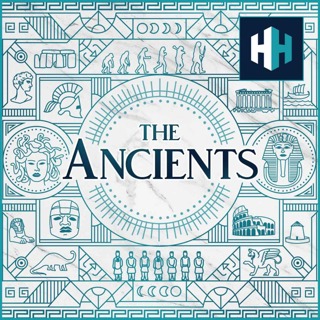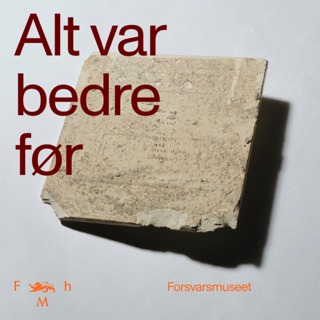
Jason and the Golden Fleece
This week's episode from the History Hit archive features the brilliant Tom Holland telling the myth of Jason and the Argonauts, an epic story of honour, adventure, dangerous women and a golden fleece. Told with wit, verve and passion, this magical tale of the first group of super-heroes will be a treat for all, whether young or old. This was recorded at the 2016 Chalke Valley history festival and first released on the Chalke Valley History Hit Podcast. Hosted on Acast. See acast.com/privacy for more information.
17 Sep 202054min

Alexander the Great: Through Persian Eyes
Conqueror. Destroyer. Convert. Legendary king. It's fair to say that Alexander the Great's relationship with ancient Persia was complicated. Despite conquering the Persian Empire, Alexander admired and adopted many aspects of Persian culture. Despite sacking the prestigious Persian centre of Persepolis, he honoured the great Persian king Cyrus and married a Persian princess. Alexander may have conquered the Persian Empire, but ultimately this conqueror became a willing 'captive' of Persian culture.Alexander was extraordinary - one of the most written about figures in history. But what did the ancient Iranians think of him?I was delighted to be joined by Professor Ali Ansari in this podcast to chat through the complicated history of Alexander the Great in the Persian narrative. A once-hated figure, overtime he was adopted into Iranian legend. This was a fascinating chat. Alexander Romance, Immortals, Persepolis, Persians, Parthians – it has it all.Some definitions from the pod:The Alexander Romance - a legendary account of the life and exploits of Alexander the Great that remained popular into medieval times. Various versions exist (Greek, Syrian, Armenian, French, Jewish, Persian and more).Zoroastrianism - the central religion of the Persian Empire (e.g. the Zoroastrian priests at Persepolis).The Seleucids - one of the Successor kingdoms that emerged in the aftermath of Alexander the Great's death. Named after its founder, Seleucus / Seleukos. Controlled Persia for over 100 years.The Parthians - an Iranian / Hellenistic culture that ruled ancient Persia after the Seleucids. They remain the longest single dynasty to have ruled Iran (c.500 years).The Immortals - the 10,000 strong guard of the Persian Achaemenid King. Hosted on Acast. See acast.com/privacy for more information.
13 Sep 202034min

The Roman Forum
Another one from the History Hit archive! The Roman Forum, also known by its Latin name Forum Romanum (Italian: Foro Romano), is a rectangular forum (plaza) surrounded by the ruins of several important ancient government buildings at the centre of the city of Rome. Citizens of the ancient city referred to this space, originally a marketplace, as the Forum Magnum, or simply the Forum.For centuries the Forum was the centre of day-to-day life in Rome: the site of triumphal processions and elections; the venue for public speeches, criminal trials, and gladiatorial matches; and the nucleus of commercial affairs. Here statues and monuments commemorated the city's great men. The teeming heart of ancient Rome, it has been called the most celebrated meeting place in the world, and in all history. Located in the small valley between the Palatine and Capitoline Hills, the Forum today is a sprawling ruin of architectural fragments and intermittent archaeological excavations attracting 4.5 million sightseers yearly.This episode was first broadcast on Darius Arya Digs. Hosted on Acast. See acast.com/privacy for more information.
11 Sep 202025min

The Vestal Virgins
Priestesses of Vesta, Goddess of hearth, home and family, the College of Vestal Virgins were Rome’s only full-time priesthood. They numbered only six and were selected from noble Roman families at an early age, between six and 10 years old. They would tend the sacred fire in the Temple of Vesta and remain virgins for the duration of their tenure, which would stretch long into womanhood, lasting at least 30 years. Their importance to Rome was paramount and throughout this ancient civilisation's pagan history, the Vestal Virgins remained right at the heart of Roman society. But things were not always plain sailing for the Vestals during their 1,000 year history... I was delighted to be joined by a leading light on this subject Peta Greenfield to talk through the history of the Vestals. From the importance of fire and water for the cult to the infamous Vestal punishment of 'incestum' Peta explained the history behind all in this brilliant chat.Quick note:Octavia was Octavian / Augustus' sister.Livia was Augustus' wife. Hosted on Acast. See acast.com/privacy for more information.
6 Sep 202046min

Pax Romana
Time for a delve into the History Hit ancient history archives! In this podcast Dan Snow sits down with the brilliant Adrian Goldsworthy to ask the big questions surrounding the success of Imperial Rome. Why did the Roman Empire last so long? What were the keys to its success? Why were its soldiers so effective? And so much more. This podcast was initially released on Dan Snow's History Hit, for the publication of Adrian's book 'Pax Romana: War, Peace and Conquest in the Roman World' in 2016. But it has certainly not lost its quality!New Ancients episodes with Tristan and guests will be released every Sunday! Hosted on Acast. See acast.com/privacy for more information.
4 Sep 202042min

Kingdom of Kush
Along the banks of the River Nile, directly south of ancient Egypt and hundreds of miles away from the Mediterranean, there was a flourishing kingdom. The Kingdom of Kush. The Egyptians, Assyrians, Persians, Greeks, Nabataeans, Libyans, Romans, and not to mention countless African kingdoms - the Kushite domain boasted a remarkable history with all these ancient civilisations throughout its long history. Its existence spanned centuries; its cities were bustling centres for inter-continental trade; its art and architecture continues to amaze visitors to this day.I was delighted to be joined by Luke Pepera (@LukePepera), a historian, archaeologist and anthropologist with a passion for African history. In this podcast he shines a light on the Kingdom of Kush's history, particularly focusing on the ancient kingdom's often-overlooked interactions with Imperial Rome. He explains how the death of Cleopatra and the demise of the Hellenistic Ptolemaic Kingdom in Egypt paved the way for a major conflict between the Kushites and Romans, where the Kushite warrior queen Amanirenas led her armies against the Emperor Augustus' legions. Nevertheless, despite this hostile beginning, over the following centuries relations between the Kushites and Romans improved, with both kingdoms co-existing in relative harmony until the former's demise in the mid 4th century. This was a fascinating chat and I hope you enjoy.Luke has recently starred in two History Hit documentaries covering African history: 'The Kingdom of Benin' and 'Africa: Written Out of History'.Notes: Cornelius Gallus' campaign in Arabia Felix was against the Arabians, not the Assyrians! Hosted on Acast. See acast.com/privacy for more information.
28 Aug 202046min

Battle of Artemisium
Around this time 2,499 years ago the famous Battle of Thermopylae was raging. But it is important to remember that this clash was not happening on its own. At the same time, to the east of Leonidas' defence, another battle was underway at sea between Xerxes' great armada and a much smaller Hellenic fleet plagued with internal problems. This was the Battle of Artemisium, an often-overlooked and overshadowed military encounter of the Persian Wars. Its importance, however, was sizeable. I was delighted to have Dr Owen Rees back on the show to talk through this clash, explaining its significance and how it paved the way for one of the most famous naval battles in history: Salamis. Owen is the author of 'Great Naval Battles of the Ancient Greek World.'This episode is the second in a small series covering 4 key clashes of 480 BC, the 2,499th anniversaries of which we are celebrating this year. Some mildly-strong language. Hosted on Acast. See acast.com/privacy for more information.
23 Aug 202052min

Battle of Thermopylae
2,499 years ago the Persian 'Great King' Xerxes launched history's largest amphibious invasion of Europe before D-Day. Accompanied by a huge army and navy he crossed the Hellespont (modern day Dardanelles), intent on punishing the city-state of Athens and any other Hellenic powers that dared to resist. It was during this campaign that one of history's most famous battles was fought, at the Pass of Thermopylae in central Greece. King Leonidas, his 300 (or so) Spartans and their Hellenic allies fought off against King Xerxes' mighty Persian army for three days. To talk through this fascinating battle I'm chatting with Paul Cartledge, a professor from the University of Cambridge and one of the World's leading experts on ancient Sparta. In this fascinating chat, Paul sorts the fact from the fiction about the doomed Thermopylae defence. He starts by explaining the conflict's background, before moving on to the battle itself. We finish off by discussing how this famous battle ultimately created what we now know as 'the Spartan mirage'.This episode will be the first in a small series dedicated to talking about the 480 BC clashes of the Second Persian War, for the 2,499th anniversaries of these battles. Paul is the author of 'Thermopylae: The Battle That Changed the World.' Hosted on Acast. See acast.com/privacy for more information.
20 Aug 202058min





















